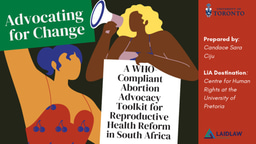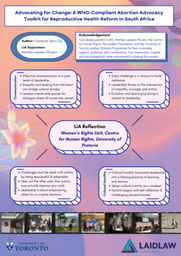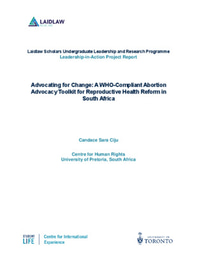End-of-Program Reflection
Growing Through Laidlaw: Lessons in Leadership, Character, and Growth
It is hard to believe that it is already time to close this chapter of the Laidlaw Scholars Programme. These two years have completely reshaped how I see myself and the world. When I first began, I thought of leadership as a skill set that could be mastered through relentless hard work and constant activity. I am ending the programme with a far deeper and more nuanced understanding. Laidlaw has taught me that ethical leadership is not simply about acquiring skills; it is about character, community, and humility. These years have been a journey of personal transformation as much as professional growth, and they have set the tone for the kind of leader I hope to become.
Learning to Adapt Through Research:
My first summer was spent fully immersed in independent research, an experience that tested my ability to manage ambiguity, stay organized, and build confidence in my ideas. The process was far from simple. Securing Research Ethics Board (REB) approval for my project became a challenge that lasted almost the entire research period. I spent weeks following up with my advisor, who supported me tirelessly, and only received the approval during the very last week of the summer. What was meant to be six weeks of data collection was compressed into a fraction of that time, and I had to quickly adapt my approach to meet the deadline without compromising quality.
Through this process, I learned to ask for help when I was stuck, to lean on mentorship, and to stay calm and resourceful even when things felt out of my control. I left that summer with a new respect for rigorous scholarship, but also with a greater appreciation for its limitations. Research is not just about producing results; it is about raising thoughtful questions and understanding the people and communities behind the data. This insight laid the foundation for my Leadership-in-Action experience, where I moved from analysis to action and began to see how academic knowledge and practical engagement could work hand in hand.
Lessons Beyond the Classroom:
The leadership development sessions and the Oxford Character Project played a central role in this growth. They encouraged me to think critically about my motivations, my decision-making processes, and my cultural biases. Through reflective exercises, case studies, and honest conversations with facilitators and peers, I gained a better understanding of how character shapes leadership.
Practising virtues like humility, resilience, and empathy required me to stretch myself in ways I had never done before. Rather than trying to fit a mold of what a leader “should” look like, I learned to lead from my values and to find confidence in authenticity. The sessions on conflict management and professional development were particularly impactful, as they taught me how to approach challenging conversations with compassion and how to prioritise goals effectively. These lessons continue to guide me as I grow into a leader who is both principled, realistic, but optimistic.
Building a Global Network:
One of my favourite aspects of the Laidlaw experience hands-down has been the opportunity to connect with scholars from my cohort and around the globe. At the annual conference at Columbia University, I was inspired by the diversity of thought and experience within the cohort. I enjoyed meeting Laidlaw scholars from all over the world and engaging in discussions that ranged from regional politics, cancer research to cinema architecture! These converstions broadened my perspective and reminded me that leadership is not limited to a single field. It is a universal practice that takes many forms.
Being a global citizen is about far more than being aware of international issues. It is about building genuine relationships, learning to see the world through different lenses, and practicing empathy at every turn. Ethical leadership, I realised, is deeply human work. Connecting with peers has also made the programme unforgettable for unexpected reasons, like discovering new music through the Scholars’ Conference playlist that I still revisit to this day!
Mzansi Summer 2025:
The Leadership-in-Action project was where all of these lessons came together. In South Africa, I had the privilege of working at the Centre for Human Rights, alongside a brilliant team who had spent their lives serving women in their communities. Being welcomed into this environment taught me to listen first, to set aside assumptions, and to understand leadership as a deeply collaborative effort.
Rather than stepping in with pre-set solutions, I asked how I could be helpful, what skills I could contribute, and how I could support the important work already underway. I was deeply moved by my colleagues’ determination, resilience, and heart-driven leadership. They demonstrated that true leaders lead with empathy and purpose, even in the face of systemic challenges, and their example left a lasting impression on me.
Growing Into My Values:
Looking back, what stands out most is how this programme has pushed me to examine my character. Ethical leadership requires constant self-reflection, honest conversations about privilege and power, and the courage to make difficult choices. These lessons have become part of my daily life, influencing how I approach challenges in academic, professional, and personal settings. I have also developed a stronger sense of resilience. In moments where plans fell apart or I felt out of my depth, I learned to be patient with myself and view setbacks as opportunities for growth. That change in mindset has been one of the most valuable takeaways from this journey.
The programme has also transformed how I see success. In the past, I often chased external achievements, striving to meet high expectations and comparing myself to others, which led to burnout. Through Laidlaw, I have learned to celebrate all wins, whether big or small, and to focus on growth, service, and happiness rather than solely chasing prestige. Going forward, I hope to use my voice to amplify those who are often overlooked and to continue promoting social justice, climate action, and women’s and human rights. Global citizenship means recognising that local and global issues are interconnected, and it is my responsibility to take action wherever I am. Over the next decade, I hope to build a career that reflects these commitments while remaining grounded in the lessons of empathy and humility that Laidlaw has instilled in me.
Here's To A Lifetime of Growth:
The Laidlaw Scholars Programme has been transformative, not because it provided me a formula for leadership, but because it gave me a framework for lifelong growth. I am leaving with more questions than I began with, but they are deeper, better questions that will continue to challenge me. More than anything, this experience has shown me that leadership is not a destination but a lifelong practice of service, learning, and openness to change. It is a privilege and a responsibility to carry these lessons forward, and I am deeply grateful for every mentor, friend, and community that has shaped my Laidlaw journey.



Please sign in
If you are a registered user on Laidlaw Scholars Network, please sign in